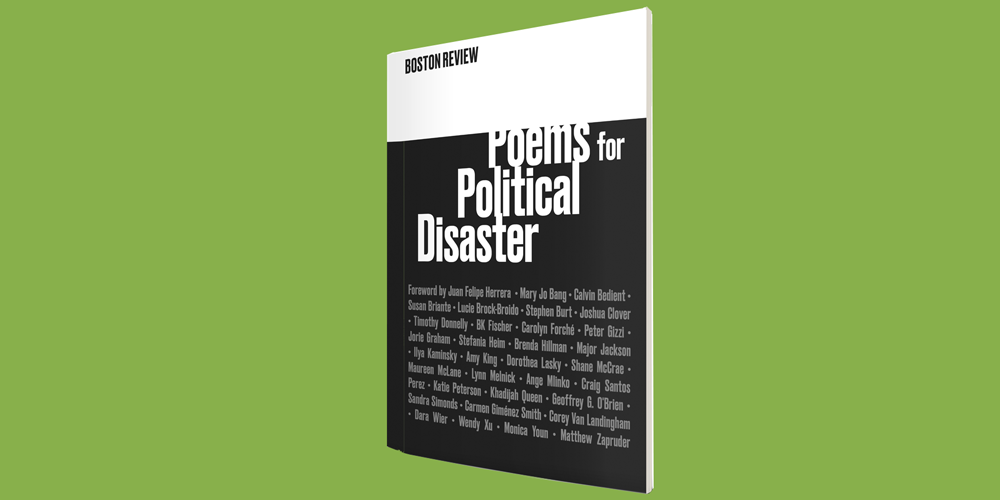Chapbook is a Boston Review publication that reflects on and responds to our contemporary moment. The very first in this series, Poems for Political Disaster, emerged as a response to Donald Trump's election.
“In time of crisis, we summon up our strength,” wrote poet Muriel Rukeyser. This collection gathers poems—from the eve of the twenty- first century to the month following Trump’s election—to mark a moment of political rupture, summoning the collective strength found in the languages of resistance and memory, subversion and declamation, struggle and hope. Poetry is a counterforce. We offer these poems to readers as Rukeyser did—“not walls, but human things, human faces.”
“When freedom is in danger, when you are asked, in one faked way or another, a shabby admonition, to leave your own humanity which includes the humanity of all, the alarm is extra-ordinary, America. Don’t you think so? You must respond, America. You must speak out, you must write.”
— U.S. Poet Laureate Juan Felipe Herrera, from the Foreword
CONTENTS
Foreword
Juan Felipe Herrera
The Ingenuity of Animal Survival
Peter Gizzi
In November We Inched Closer
Mary Jo Bang
America (after Allen Ginsberg)
Craig Santos Perez
In Which Rising Inequality Eventually Triggers Countervailing Social Dislocations
Dara Wier
In the Event of an Apocalypse, Be Ready to Die
Khadijah Queen
The American Security Against Foreign Enemies Act
Lucie Brock-Broido
We’ll Go No More a Roving
Shane McCrae
English as a Second Language
Nathan Xavier Osorio
Letter to a City under Siege
Carolyn Forché
Inauguration Poem
Lynn Melnick
Concord Grapes
Stephen Burt
You the Recoil
Susan Briante
#WTF
Maureen N. McLane
Women Own a Violence Too
Amy King
December
Matthew Zapruder
Watch Us Elocute
Marcus Wicker
Bad Intelligence
Corey Van Landingham
Safe House
Solmaz Sharif
America! America!
Ricardo Maldonado
A Guide to Usage: Mine
Monica Youn
I Want to Read at the White House
Joshua Clover
Excuses
Carmen Giménez Smith
from Atopia
Sandra Simonds
Ferguson
Major Jackson
We Lived Happily During the War
Ilya Kaminsky
Linear Travel
Wendy Xu
Days of 2016
Ange Mlinko
Sat Down and Wept by Lake and Cloud Gear
Calvin Bedient
Filibuster to Delay Them All
Katie Peterson
Credo
Andrew Zawacki
Guantánamo
Jorie Graham
Riddle
Jericho Brown
Disaster
Dorothea Lasky
Poem of Hope, Almost at Equinox
Brenda Hillman
To Classes
Geoffrey G. O’Brien
the experiment
Juan Felipe Herrera







